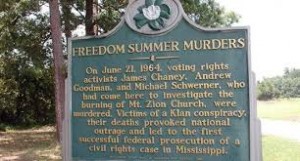
Mississippi Archivist Reflects on History of Segregation
By Jack Elliott Jr.
Mississippi archivist reflects on the history of segregation as he prepares to retire after 42 years of sorting and preserving a diverse compilation of records. Nearly two decades ago, Hank T. Holmes oversaw the release of records from the defunct Mississippi Sovereignty Commission, a segregationist agency that spied on civil rights workers.
The Sovereignty Commission was created in 1956. It spied on civil rights workers and sought to bypass federal mandates for voting rights and racial integration.
Holmes and his staff had to get the files - boxes of reports and yellowed newspaper clippings - into a computerized form that could be searchable while preserving the identities of those who sought to have their names redacted under a federal court order.
Holmes will retire next year after 42 years with the Mississippi Department of Archives and History, including nine years as executive director.
Preparing for release of the Sovereignty Commission files was an onerous task.
"One of the most touching things was that older folks would come in with their grandchildren - old folks who were in the records - and sit down at a terminal and talk with them about the way things were," Holmes said this past week. "Those were things that showed me we were fulfilling the mission of preserving our history."
Gov. Bill Waller vetoed its funding in 1973, forcing it to become inactive. In 1977, lawmakers voted to seal the records for 50 years. However, the ACLU sued and in 1989 a federal judge ruled the files should be public and set privacy safeguards.
Reporters and researchers converged in Jackson from all over the country on March 17, 1998, for a chance to dig into the digitized files of the Sovereignty Commission.
Before documents' release, there had been speculation the files could contain secrets about Ku Klux Klan killings and even include the names of civil rights figures who may have been on the commission payroll. While some documents raised eyebrows __ the watchdog agency had dispatched a spy to the scene near Philadelphia, Mississippi, to sketch a map of where the bodies of three murdered civil rights workers were buried in 1964 - there were no major revelations.
"I think that some people had been expecting some sensational stories coming out of that (release of documents) and there weren't many, if any," Holmes said. "But it was - and remains to me- very chilling to read through those documents and see what activities the state was involved in with its citizens."
To promote a segregated society and hush news unflattering to that cause, the commission hired a public relations officer and produced propaganda films to depict race relations in the best possible light. The agency subverted members of the black press by spreading rumors and misinformation about the civil rights movement and enjoyed the cooperation of some of the state's most influential white-owned newspapers and broadcasters.
The commission hired investigators, many retired FBI and state Highway Patrol officers, recruited and paid informants who reported from within the civil rights movement and scanned articles in publications from around the country for information on the activities of movement leaders.
The files released showed the commission kept track of anyone and anything even remotely considered a threat to white supremacy. The documents, some hand-scribbled by commission underlings on scraps of paper or newspaper clippings, show the commission's spy tentacles reached into almost all areas of Mississippi life, from small black church gatherings to college campuses.
Apparently, there was nothing off limits. Even writing down license tag numbers of cars parked outside NAACP meetings was an assignment in order to identify those who attended.
Holmes said some people were disappointed when they dove into the documents.
"And one of the things about the opening of the documents was that some complained their names were not in there - it was a sort of a badge of honor with some folks," he said.
Copyright 2014 The Associated Press.
Feature Photo Credit: blog.gulflive.com






No Responses to “Mississippi Archivist Reflects on History of Segregation”